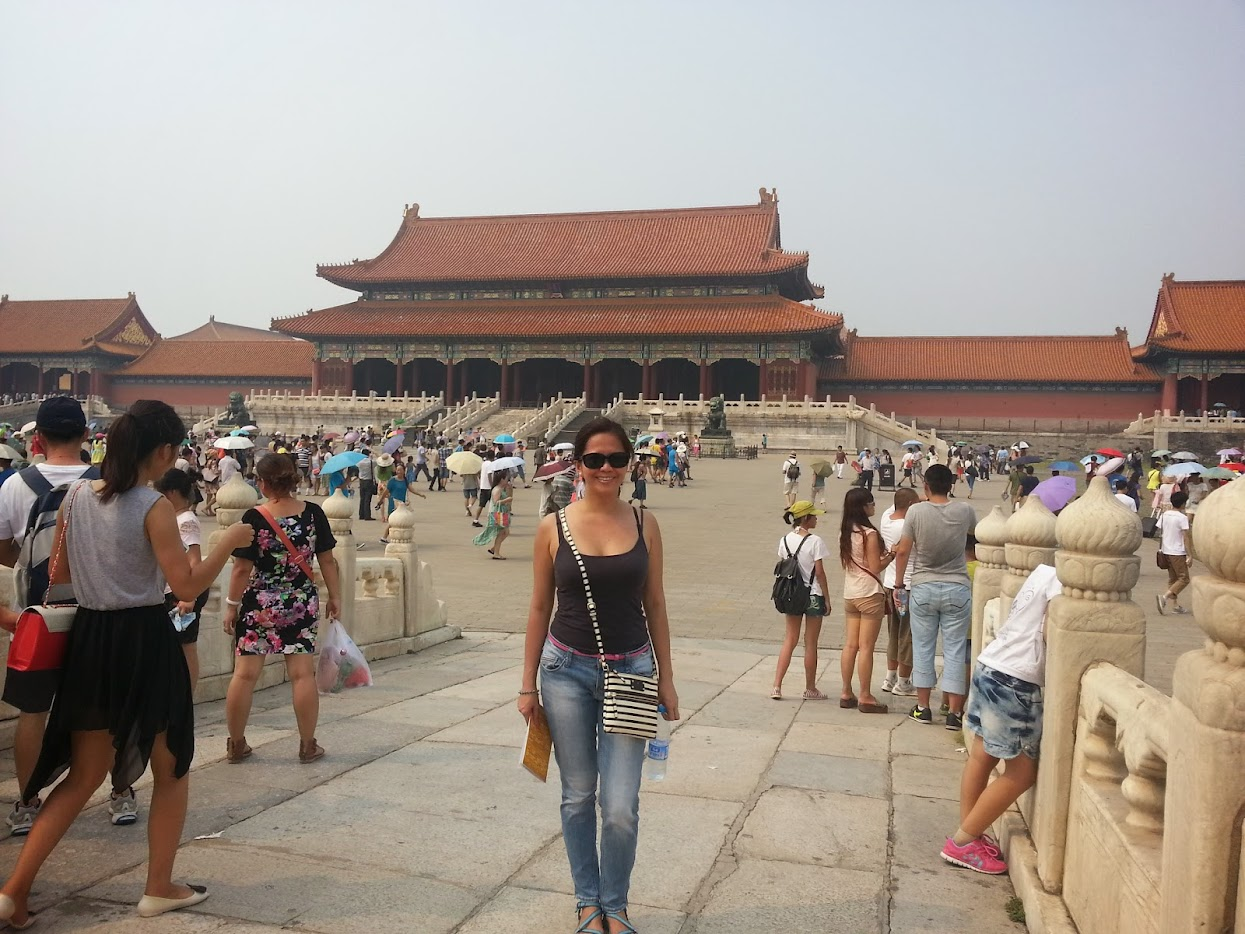
Posted April 11, 2025
By Sean Ring
YUGE Trouble in Little China
I lived in Asia for 13 years. I spent the first six years in Singapore, where I met and married my wife, Pam. The next 3 ½ years were in Hong Kong, where our son, Micah, was born. We spent the final 3 ½ years in Cebu, the Philippines, waiting out the pandemic before moving to Italy in April 2022.
So, as a foreigner, I have some knowledge of the place. Although I only lived in Hong Kong, I have traveled to Beijing, Shanghai (and Taipei, too).
Luckily, I have the pictures to prove it. In August 2013, Pam and I spent a long weekend in Beijing. Before Micah was born, it was easy for us to hop on a plane and go anywhere. We were still living in Singapore then, but a 6-hour plane ride was nothing to us.

Pam, standing on the Great Wall of China. Credit: Sean Ring

Pam, standing in the Forbidden City. Credit: Sean Ring
You can’t imagine the immensity of the place until you’ve been there. Beijing is bigger than Connecticut. And it feels it. Shanghai is even larger. It boggles the Western mind. It surely blew me away.
Pam and I sat in the kitchen a few nights ago, reminiscing about our travels. We were lucky to be able to go anywhere at any time. But the world is changing. The age of unfettered travel is coming to an end.
But that’s nothing compared to the coming bifurcation of the world economy. Thanks to the Chinese government, we’re finally figuring out the absurdity of trading with the enemy.
China Messes With U.S. Infrastructure
Straight from The Wall Street Journal:
Chinese officials acknowledged in a secret December meeting that Beijing was behind a widespread series of alarming cyberattacks on U.S. infrastructure, according to people familiar with the matter, underscoring how hostilities between the two superpowers are continuing to escalate.
The Chinese delegation linked years of intrusions into computer networks at U.S. ports, water utilities, airports, and other targets to increasing U.S. policy support for Taiwan, the people, who declined to be named, said.
Usually, you’d need to use an oyster shucker to get this kind of truth from the Chinese. But in a rare moment of geopolitical candor, senior Chinese officials acknowledged their role in a sprawling campaign of cyberattacks against U.S. infrastructure — and linked it directly to America’s growing support for Taiwan.
The “nod-and-a-wink” came during a meeting between representatives of the outgoing Biden administration and a high-level Chinese delegation.
According to U.S. officials, the Chinese didn’t come right out and say, “We did it,” but they didn’t have to. A senior cyber official from China’s Ministry of Foreign Affairs made comments interpreted across the board as a tacit admission of responsibility for what’s been dubbed the Volt Typhoon campaign.
The “Typhoons”
Volt Typhoon targets civilian infrastructure — water systems, ports, airports, power grids — the lifelines of modern society. U.S. officials have warned for over a year that this is about Beijing laying the groundwork for potentially crippling attacks in the event of conflict, especially over Taiwan. Beijing wanted Washington to understand that those warnings were not overblown.
They were deliberate.
The implications are staggering—not just because China admitted what it’s long denied but because the admission signals a shift in posture. The gloves are coming off.
The Geneva meeting also touched briefly on another cyber campaign, Salt Typhoon, which gave China access to U.S. telecom networks and let them spy on unencrypted communications from political leaders and government officials — even inside the Trump and Harris presidential campaigns. That breach was historic in scope, but officials considered Volt Typhoon the more dangerous provocation because it crosses a line: moving from espionage to positioning for potential sabotage.
To make matters worse, while the Trump administration has promised a more aggressive cyber stance, it is also in the process of cutting cybersecurity staff and recently fired the heads of the NSA. All the while, Chinese hackers can access sensitive U.S. networks.
Trade War Escalation
The U.S. and China are already in a trade war. The Donald applied new tariffs to respond to China's perceived economic coercion. Now, with Beijing effectively admitting to cyber sabotage on civilian infrastructure, it adds a new layer of justification.
This makes the current tariff environment more permanent and more politically defensible.
The moment infrastructure is involved—especially critical infrastructure like water and power—tariffs aren’t just about economics. They're about defense. This shifts the rationale from protecting jobs to protecting lives, a far more powerful narrative domestically and harder for multinationals or Congress to push back against.
With Chinese cyber players embedded in telecoms and U.S. cloud networks, expect more aggressive export controls on U.S. semiconductors, AI chips, and cloud infrastructure — and possibly new import restrictions on Chinese hardware (servers, routers, base stations). Think TikTok bans, but broader and more systemic.
Before this, tariffs were justified based on trade imbalances, IP theft, or industrial espionage. Now, they can be tied to cyber sabotage, widening the net. Companies and industries not directly involved in tech or telecoms could get caught in a new round of punitive measures.
Beijing has already begun retaliating with export restrictions on key materials like graphite, gallium, and rare earths. While China may retaliate against US tariffs, it’s likely to be more targeted than a full-scale tariff war, given its deflation, youth unemployment, and struggling real estate sector.
Wrap Up
The Chinese may be telling the truth because they fear escalation and the damage it’ll do to both countries. And yet, China has its hands on America’s proverbial family jewels.
The USG’s first obligation is to protect its people. It must find a way to remove Chinese players from America’s infrastructure while decoupling from Chinese markets and vendors. Ordering bullets from the people you may be shooting at no longer looks good.
The puzzle is how to do this without crashing either’s economy.

How a Missed Phone Call May Cost Trump Big
Posted April 23, 2025
By Sean Ring

Charlie Munger’s Mental Models
Posted April 22, 2025
By Sean Ring

The People Who Need and Deserve Our Help
Posted April 21, 2025
By Sean Ring

The Order of Love: Why Nations Must Prioritize Their Own
Posted April 18, 2025
By Sean Ring

We’re Screwed If We Don’t Do the Math
Posted April 17, 2025

